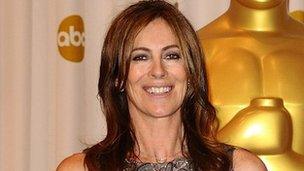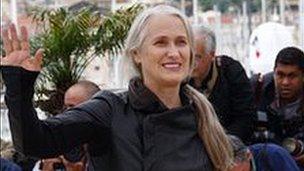Hoping for a Bigelow breakthrough
- Published
Kathryn Bigelow, the first woman to win the best director Oscar, was only the fourth female film-maker to be nominated in the category.

Bigelow's films include Point Break and K-19: The Widowmaker
She joined a select list featuring Sofia Coppola for Lost in Translation (2004), Jane Campion for The Piano (1994) and Italian director Lina Wertmuller for Pasaqualino Settebelleze (Seven Beauties) in 1977.
Dutch film-maker Marlene Gorris won an Oscar in 1996 for her movie Antonia's Line but it was for best foreign language film rather than in the director category.
Hollywood denial
That Bigelow's win is such a talking point raises the question of why women film directors remain such a rarity in Hollywood.
Bigelow herself is often reluctant to be referred to as a female director, making no reference to her gender in her Oscars acceptance speech.
"I suppose I like to think of myself as a film-maker - not a female film-maker," she recently said as she picked up the best director honour at the Directors' Guild of America awards.

Jane Campion has urged women directors to "put on their coats of armour"
But the Celluloid Ceiling - an annual report issued by San Diego State University about the employment of women in movies - estimated that, out of the top 250 grossing films of 2009 in the US, women only directed about 7% of them.
This represents a decrease of 2% from the previous year and, perhaps more worryingly, shows no change from the percentage of women directing in 1987.
The report's author, Martha Lauzen, says Hollywood is in denial about the lack of women behind the camera.
"I've heard editors of major trade publications as well as the heads of studios simply say there is no problem," she told the AFP news agency.
"They'll either say no celluloid ceiling exists or they'll rattle off four or five names of high-profile directors who happen to be women and then with a shrug say, 'see - there's no problem'.
"Well that's incredibly misleading. Just because you can name four or five women directors doesn't mean no problem exists.
"If you don't think there's any problem then you're not going to be looking for a solution and that perpetuates the status quo."
Industry 'myths'
Amy Mole, managing director of the UK's Bird's Eye View Film Festival - which showcases female talent and features training labs to help women film-makers - agrees.
She hopes Bigelow's win will "encourage the industry to catch up".
She says that a number of myths exist in the film industry which do nothing to help the cause.
One such myth is that the average film-goer is a male in his 20s, she says.
"In the UK, it's actually a 30-something female," Ms Mole says.

The Hurt Locker was favourite to win the best picture Oscar
"Bigelow's win feels like a momentous occasion - by putting the spotlight on fab directors like her and making her a role model, I hope women and girls can see the role of a film director as something more attainable."
Ms Mole says that the number of UK films directed by women are also in decline, dropping from 12% to about 10% in the past year.
"It is still really quite distressing - when I started working at Bird's Eye, I thought 25% would be bad enough," says Mole.
So what else could be causing the decline?
Mole believes the nature of the job is an important factor.
"There's little job security, erratic scheduling, it's unstable, there are frequent long location shoots," she explains.
"So if you want to think about child-rearing, it's not that compatible.
"Jane Campion took a few years out recently and came back with Bright Star.
"But she was able to do that because she's Jane Campion - completely impossible for lesser-known directors."
Jehmu Greene is president of New York's Women's Media Centre (WMC), which aims to boost the representation of women behind and in front of the camera in the US.
In a blog on the WMC website, Greene says Hollywood is "an industry set in its ways - a boys' club with a focus on producing movies for a 14 to 25-year-old male audience".
"Women now make up more than half the workforce in the US and yet are still left out of writing, directing and producing top films," she adds.
Risk-taking
Kate Kinninmont, chief executive of British organisation Women in Film and TV (WFTV), also believes sexism is at work.
"Lots of women are making short films - but the move to making a feature is where women don't seem to be able to get the finance," she told the BBC News website.
"Are people prepared to invest in a woman? The equality bill has been around for yonks but it's the same kind of thing if you look at the cabinet or High Court judges - there are hardly any women."
WFTV is trying to change this with initiatives including a women to women mentoring scheme for directors of TV, movies and shorts.
"Another part of it is women often lack the confidence to be really bullish and get out there," she adds.
But she too hopes that Bigelow's win can be a watershed moment: "She's done something that would have been seen as a traditionally male film, people have taken a risk on her.
"This shows the financiers that women can make great films."